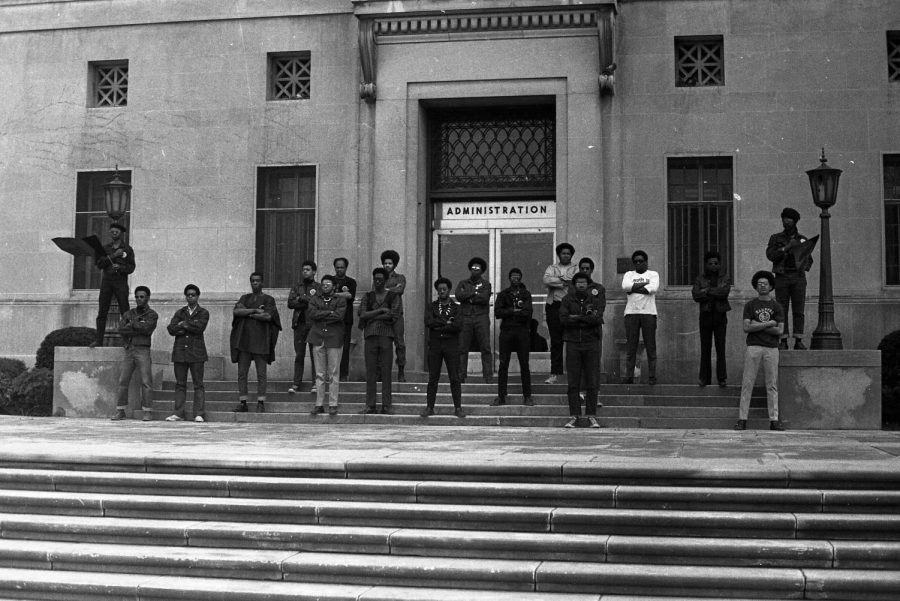Most people at Kent State know that Black United Students advocates for Black student rights and equality. Less known is its legacy of activism and role in founding Black History Month, now celebrating its 55th anniversary alongside the 50th anniversary of BUS.
Founded in 1968, during the Civil Rights movement, BUS was born out of a series of critical events. Mwatabu Okantah, an alumnus and chair of the Department of Africana Studies, explained how the group emerged.
“In 1967, the Kent chapter of Students for a Democratic Society, they invited two members from a black self-defense group called the Deacons for Defense in Justice… to campus to speak,” Okantah said. “What came out of their presentation, black students formed themselves into Black United Students.”
The next year, in 1968, the organization grew in response to decisions made by the administration that led to a historic protest. When the university had Oakland police force to recruit on campus, Black students pushed for the removal of the police presence, citing concerns over safety and racial discrimination.
When their request was denied, the students organized a walkout, leaving campus in protest. This pivotal moment marked the beginning of a more organized and vocal movement for Black students at Kent State.
“The university allowed the Oakland police force to recruit on campus,” Okantah said. “[Black students] asked university administrators to remove the Oakland police force and they refused. So, they walked off campus.”
Okantah, who arrived at Kent State in the aftermath of the May 4th shooting, recalled his initial experience of the campus. The university had closed after the shooting, and campus didn’t reopen until that Fall semester. As a freshman, he was unaware of the Black United Students organization at first.
“I arrived on campus the day it reopened because students were shot the previous May. After the May 4 shooting, the campus closed. It didn’t reopen until that September,” Okantah said. “So, as a freshman student, I mean it’s kind of funny I didn’t know who Black United Students were.”
Looking at the present, Okantah sees the echoes of the past struggles in the ongoing fight for equity.
“Every generation has its own play,” he said. “ I do think your generation is waking up. The whole pushback against Black History Month, Women’s and Latin History Month in the wake of that letter from the Department of Education.”
The Dear Colleague letter, issued on Feb. 14, outlined what race and national origin-based educational programs will have to end for the university to continue receiving federal funding, sparking debates about the future of diversity and inclusion efforts on campuses nationwide.
Okantah believes the current climate is a reminder that challenges around representation and inclusion are not new. The fight for recognition and respect, he said, is a continual process that requires action from each generation.
Julian Grimes, the current president of BUS, echoed Okantah’s sentiments about the importance of history in guiding the future. He emphasized the significance of understanding the past generations is crucial for today’s students to continue pushing for progress.
Grimes pointed out that the groundwork laid by previous generations must not be forgotten, and it’s now up to today’s students to keep advocating for change and representation.
“There’s a lot of history that goes with Black students here,” Grimes said. “Even just having [Oscar Ritchie Hall] there’s like so much history.”
Grimes also reflected on the persistence of past struggles. He believes the ongoing fight for justice requires a continuous effort, as each generation confronts its own set of obstacles while building on the work of those before them. This persistence, he said, is what keeps the mission of BUS alive and relevant today.
“[Alumni] protested them taking away the Kuumba house, which was one of the houses we received from the walkout,” Grimes said. “They put money into fixing a rat-infested house and made it their own, and then [Kent State] knocked it down.”
Both Grimes and Okantah emphasized the need for ongoing activism and the significance of the future.
“[Alumni] can’t believe what this is,” Okantah said. “So, the reality is your generation’s presence in [Oscar Ritchie Hall] represents what, for them, was a vision of the future.”
BUS’ ability to adapt and endure over the past 50 years is a powerful reminder of the resilience and determination of Black student organizations everywhere. What began as a demand for basic rights and representation has evolved into a force that its leaders promise will continue to shape Kent State for years to come.
“I really do feel like if things go the way they are going there will be more demonstrations on campus,” Grimes said.
As BUS looks to the future, both its alumni and current members are committed to advocating for Black students and pushing for systematic change.
On Feb. 28, BUS will host an event in Oscar Ritchie Hall from 4 p.m. to midnight featuring alumni, who were among the original founding members of the organization. The event comes in response to the federal order requiring institutions to cease funding programs related to diversity, equity and inclusion.
Makayla Jones is a reporter. Contact her at [email protected].



Cecilia Wolfe • Feb 28, 2025 at 5:03 pm
Very informative!
Dorcus Johnson • Feb 28, 2025 at 12:38 am
Excellent reporting on essential campus news for historic BUS activities!!